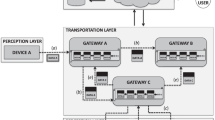Abstract
Byzantine Fault Tolerant (BFT) protocols have been used in blockchains due to their high performance and fast block acceptance. However, their weakness is a lack of scalability to support a large number of nodes in the network due to message demanding broadcasts. There have been recent improvements to the classic Practical Byzantine Fault Tolerant (PBFT) protocol. Evaluating the performance and reliability of the different BFT based protocols in the context of blockchains will give users a better picture of the behaviour and scalability of these protocols under different circumstances. For this purpose, we implemented and evaluated the performance of different BFT based protocols for blockchains under normal conditions as well as when byzantine failures are encountered in the network. Furthermore, we also calculated the reliability of each protocol under the desired throughput.
Access this chapter
Tax calculation will be finalised at checkout
Purchases are for personal use only
Similar content being viewed by others
References
Buchman, E.: Tendermint: byzantine fault tolerance in the age of blockchains (2016). http://atrium.lib.uoguelph.ca/xmlui/bitstream/handle/10214/9769/Buchman_Ethan_201606_MAsc.pdf. Accessed 06 Feb 2017
Buterin, V., Griffith, V.: Casper the friendly finality gadget (2017). arXiv:1710.09437. Accessed 06 Nov 2017
Castro, M., Liskov, B.: Practical byzantine fault tolerance. In: Proceedings of the Third Symposium on Operating Systems Design and Implementation, OSDI 1999, Berkeley, USA, pp. 173–186. USENIX Association (1999). http://dl.acm.org/citation.cfm?id=296806.296824
Pike, D., Nosker, P., Boehm, D., Grishm, D., Woods, S., Marston, J.: Proof-of-stake-time (2015). https://www.vericoin.info/downloads/VeriCoinPoSTWhitePaper10May2015.pdf. Accessed 12 Mar 2019
Duan, S., Meling, H., Peisert, S., Zhang, H.: BChain: byzantine replication with high throughput and embedded reconfiguration. In: Aguilera, M.K., Querzoni, L., Shapiro, M. (eds.) OPODIS 2014. LNCS, vol. 8878, pp. 91–106. Springer, Cham (2014). https://doi.org/10.1007/978-3-319-14472-6_7
Fischer, M.J., Lynch, N.A., Paterson, M.S.: Impossibility of distributed consensus with one faulty process. J. ACM 32(2), 374–382 (1985). https://doi.org/10.1145/3149.214121
Garay, J.A., Moses, Y.: Fully polynomial byzantine agreement for \(n > 3{\rm t}\) processors in \(t+1\) rounds. SIAM J. Comput. 27(1), 247–290 (1998). https://doi.org/10.1137/S0097539794265232
Gärtner, F.C.: Byzantine failures and security: arbitrary is not (always) random. In: INFORMATIK 2003 - Mit Sicherheit Informatik, Schwerpunkt “Sicherheit - Schutz und Zuverlässigkeit”, 29 September–2 Oktober 2003 in Frankfurt am Main, pp. 127–138 (2003). http://subs.emis.de/LNI/Proceedings/Proceedings36/article1040.html
Golan-Gueta, G., et al.: SBFT: a scalable decentralized trust infrastructure for blockchains. CoRR abs/1804.01626 (2018)
Jalalzai, M., Busch, C.: Window based BFT blockchain consensus. In: 2018 IEEE International Conference on Blockchain (Blockchain 2018), Halifax, Canada (2018)
Lamport, L., Shostak, R., Pease, M.: The byzantine generals problem. ACM Trans. Program. Lang. Syst. 4(3), 382–401 (1982). https://doi.org/10.1145/357172.357176
Luu, L., Velner, Y., Teutsch, J., Saxena, P.: Smartpool: practical decentralized pooled mining. In: 26th USENIX Security Symposium (USENIX Security 2017), Vancouver, pp. 1409–1426. USENIX Association (2017). https://www.usenix.org/conference/usenixsecurity17/technical-sessions/presentation/luu
Nakamoto, S.: Bitcoin: a peer-to-peer electronic cash system. http://bitcoin.org/bitcoin.pdf
Canneti, R., Rabin, T.: Optimal synchronous byzantine agreement. Technical report (1992)
Reiter, M.K.: Secure agreement protocols: reliable and atomic group multicast in rampart. In: Proceedings of the 2nd ACM Conference on Computer and Communications Security, CCS 1994, New York, USA, pp. 68–80. ACM (1994)
King, S., Nadal, S.: PPCoin: peer-to-peer crypto-currency with proof-of-stake (2012). https://peercoin.net/whitepapers/peercoin-paper.pdf. Accessed 12 Mar 2019
Vasin, P.: Blackcoin’s proof-of-stake protocol v2. https://blackcoin.org/blackcoin-pos-protocol-v2-whitepaper.pdf. Accessed 12 Mar 2019
Wood, D.G.: Ethereum: a secure decentralised generalised transaction ledger (2017). https://ethereum.github.io/yellowpaper/paper.pdf
Wüst, K.: Security of blockchain technologies (2016). http://e-collection.library.ethz.ch/eserv/eth:49632/eth-49632-01.pdf. Accessed 08 Feb 2019
Author information
Authors and Affiliations
Corresponding author
Editor information
Editors and Affiliations
Rights and permissions
Copyright information
© 2019 Springer Nature Switzerland AG
About this paper
Cite this paper
Jalalzai, M.M., Richard, G., Busch, C. (2019). An Experimental Evaluation of BFT Protocols for Blockchains. In: Joshi, J., Nepal, S., Zhang, Q., Zhang, LJ. (eds) Blockchain – ICBC 2019. ICBC 2019. Lecture Notes in Computer Science(), vol 11521. Springer, Cham. https://doi.org/10.1007/978-3-030-23404-1_3
Download citation
DOI: https://doi.org/10.1007/978-3-030-23404-1_3
Published:
Publisher Name: Springer, Cham
Print ISBN: 978-3-030-23403-4
Online ISBN: 978-3-030-23404-1
eBook Packages: Computer ScienceComputer Science (R0)




